Banking Stocks Pointing to Initial stages of long-term Bottoming Process
Stock-Markets / Banking Stocks May 30, 2008 - 01:45 AM GMT

 Global stock markets topped out on the back of the sub-prime/credit debacle in October 2007. Prices subsequently moved lower until reaching climatic bottoms in January/March this year, triggering rallies throughout the world until a few days ago. The big question investors are grappling with at this stage is whether the rise in prices has simply been a bear market rally, or whether we are back in a primary bull market.
Global stock markets topped out on the back of the sub-prime/credit debacle in October 2007. Prices subsequently moved lower until reaching climatic bottoms in January/March this year, triggering rallies throughout the world until a few days ago. The big question investors are grappling with at this stage is whether the rise in prices has simply been a bear market rally, or whether we are back in a primary bull market.
I have previously said: “Whereas I am doubtful about the longevity of the rally, I am also not in the Armageddon school. Is the answer perhaps a ‘muddle-through' market, characterized by below-average returns? That is my hunch, for what it's worth.” (See post entitled “ Poll of the Week: Stock Markets – Which Way Jose? ” of 25 April 2008.)
In searching for answers, it is appropriate trying to get a grip on the direction of banking stocks as these are usually a good indicator of the market as a whole, especially given the large proportion of financial services of many major stock markets.
The following is a long-term chart of the S&P Banking Index relative to the S&P 500 Index, showing clearly the massive under performance of banking stocks since the middle of 2002:

Sources: Bloomberg; I-Net; Plexus Asset Management.
I have pulled out a few fundamental graphs pertaining to the US situation in order to assist in gauging the lie of the land.
Firstly, as far as lending standards are concerned, US banks are still in tightening mode.
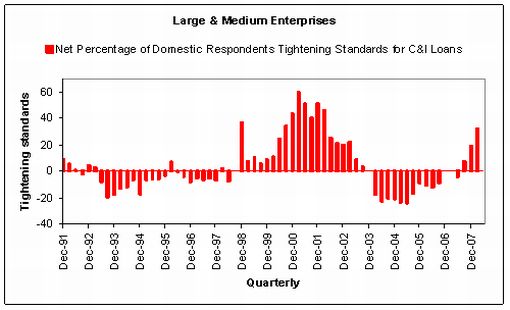
Sources: Federal Reserve Board; I-Net; Plexus Asset Management.
But it would appear that the lending standards could start easing during the current or next quarter, at least when considering the historical relationship with the Fed funds rate.
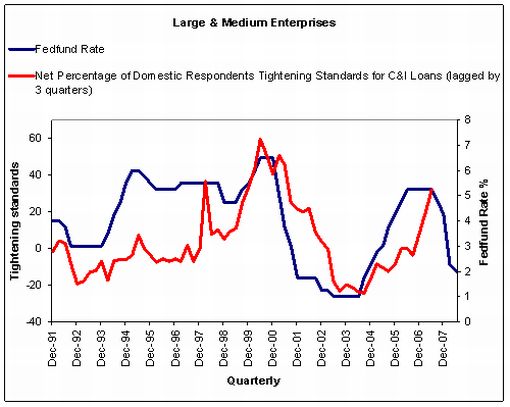
Sources: Federal Reserve Board; I-Net; Plexus Asset Management.
Interestingly, banking stocks have historically started outperforming the S&P 500 Index around two to three quarters before lending standards ease.
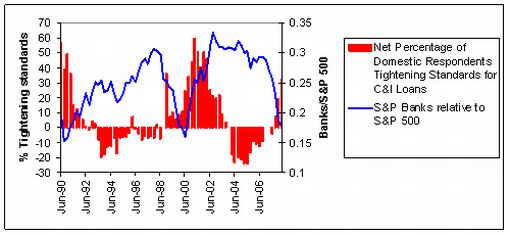
Sources: Federal Reserve Board; Bloomberg; I-Net; Plexus Asset Management.
The relative performance of banking stocks is largely driven by the “mortgage margin”. The latter has been defined for this purpose as the difference between the 30-year mortgage yield and the 30-year government bond yield, serving as a measure of risk in the housing market.
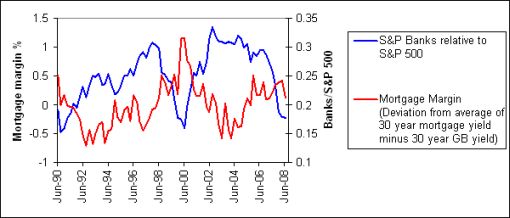
Sources: Federal Reserve Board; Bloomberg; I-Net; Plexus Asset Management.
Taking the analysis one step further, the mortgage margin in turn leads the lending standards by about two quarters.
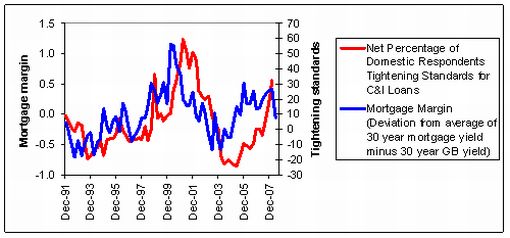
Sources: Federal Reserve Board; I-Net; Plexus Asset Management.
The next graph shows the relationship between the mortgage margin and the Fed funds rate.
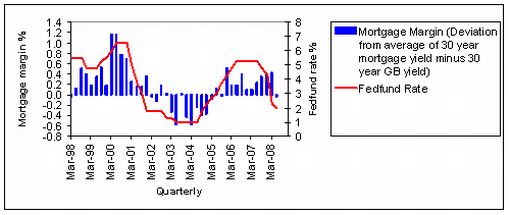
Sources: Federal Reserve Board; I-Net; Plexus Asset Management.
Putting all this together, it would appear that the underperformance of US banking stocks relative to the S&P 500 Index could be on its last legs. This conclusion is based on the mortgage margin appearing to be peaking, the Fed funds rate leading the lending standards by approximately three quarters, as well as the relationship between the mortgage margin and the Fed funds rate.
Caveat emptor: This is a relative analysis and does not provide a tool for short-term timing decisions. It does, however, alert one to the factors at play regarding the performance of banking stocks – factors beginning to point to the possible initial stages of the long-term bottoming out in the relative performance of banking stocks and, ultimately, to better prospects for stock markets as a whole.
Did you enjoy this posting? If so, click here to subscribe to updates to Investment Postcards from Cape Town by e-mail.
By Dr Prieur du Plessis
Dr Prieur du Plessis is an investment professional with 25 years' experience in investment research and portfolio management.
More than 1200 of his articles on investment-related topics have been published in various regular newspaper, journal and Internet columns (including his blog, Investment Postcards from Cape Town : www.investmentpostcards.com ). He has also published a book, Financial Basics: Investment.
Prieur is chairman and principal shareholder of South African-based Plexus Asset Management , which he founded in 1995. The group conducts investment management, investment consulting, private equity and real estate activities in South Africa and other African countries.
Plexus is the South African partner of John Mauldin , Dallas-based author of the popular Thoughts from the Frontline newsletter, and also has an exclusive licensing agreement with California-based Research Affiliates for managing and distributing its enhanced Fundamental Index™ methodology in the Pan-African area.
Prieur is 53 years old and live with his wife, television producer and presenter Isabel Verwey, and two children in Cape Town , South Africa . His leisure activities include long-distance running, traveling, reading and motor-cycling.
Copyright © 2008 by Prieur du Plessis - All rights reserved.
Disclaimer: The above is a matter of opinion and is not intended as investment advice. Information and analysis above are derived from sources and utilizing methods believed reliable, but we cannot accept responsibility for any trading losses you may incur as a result of this analysis. Do your own due diligence.
Prieur du Plessis Archive |
© 2005-2022 http://www.MarketOracle.co.uk - The Market Oracle is a FREE Daily Financial Markets Analysis & Forecasting online publication.


